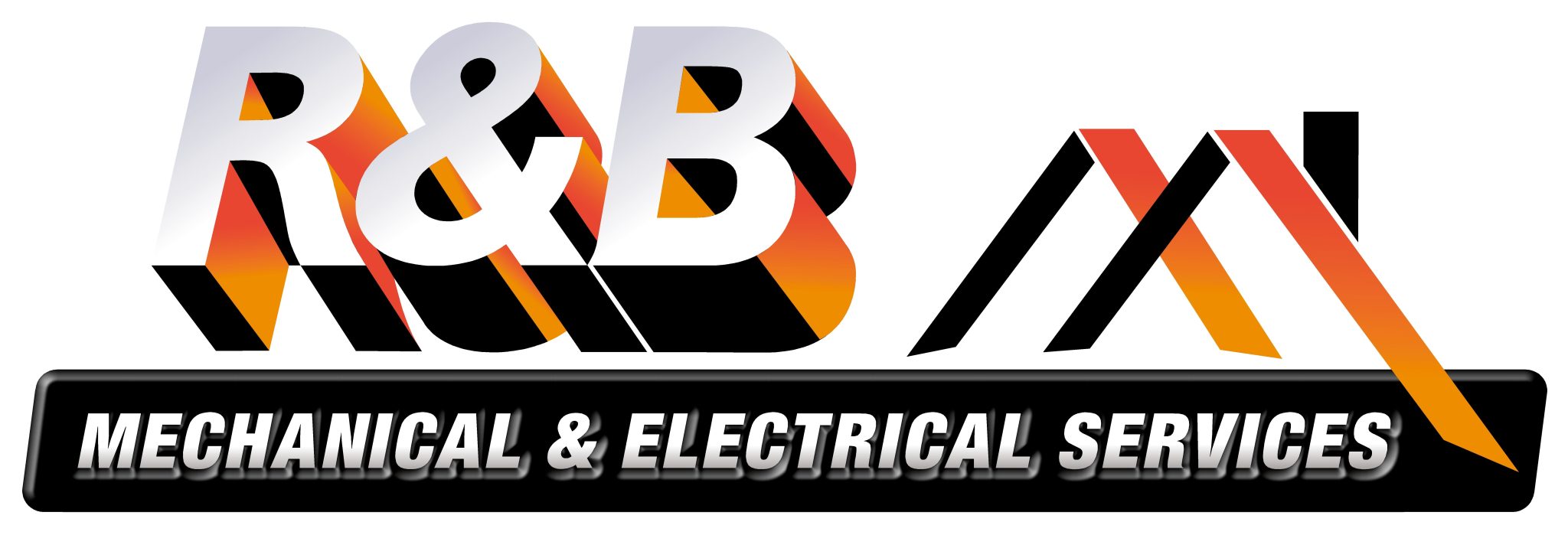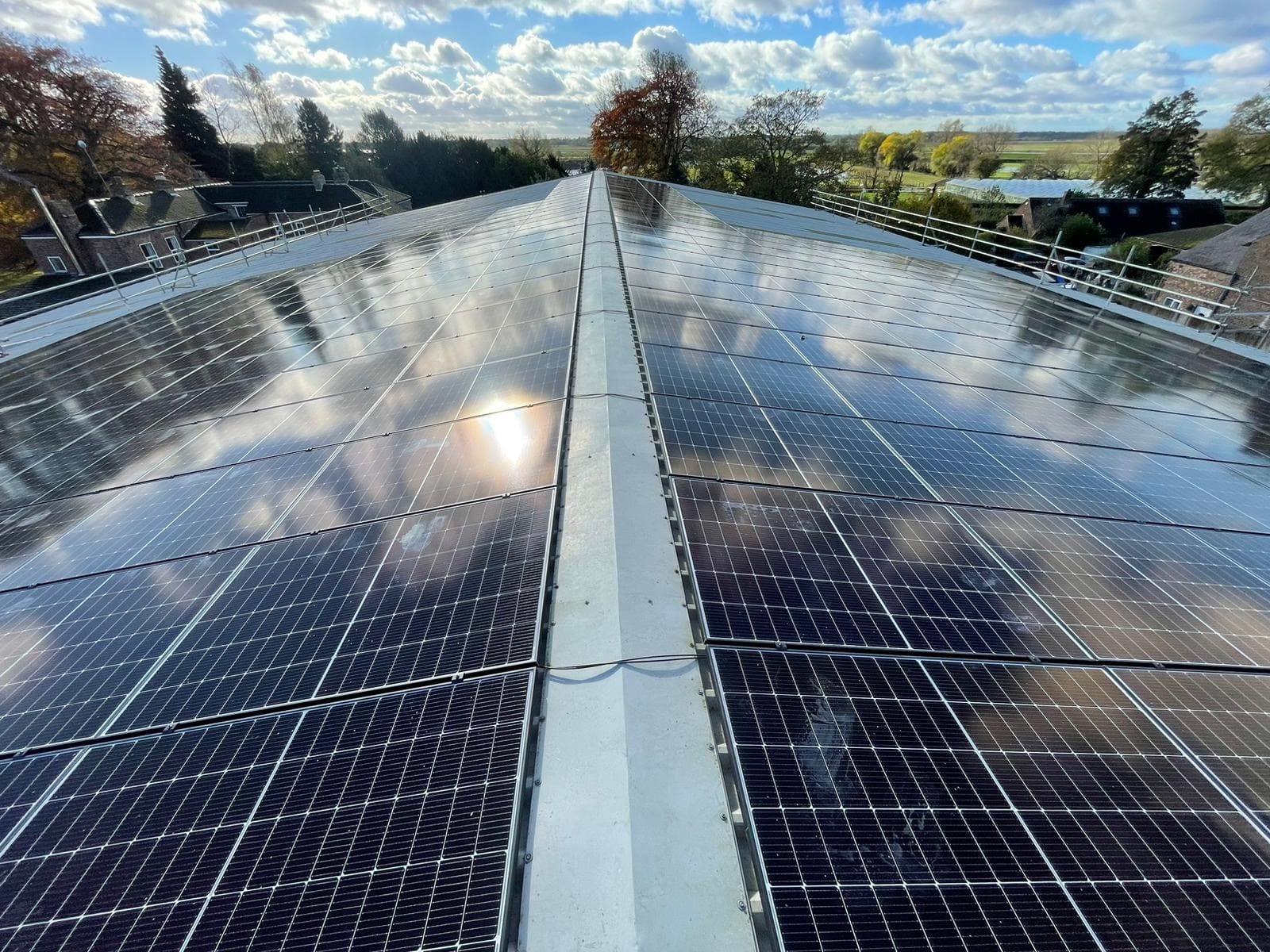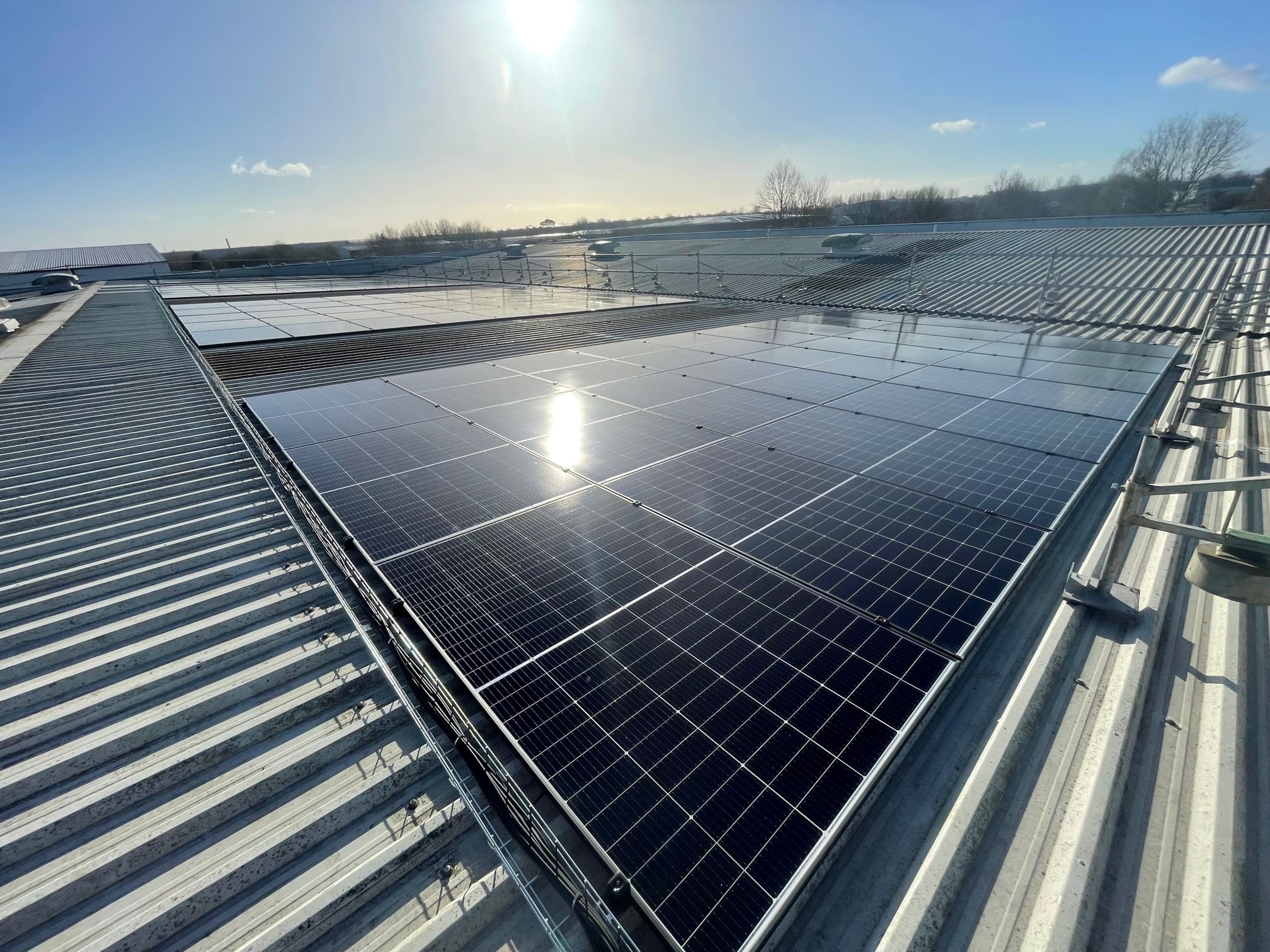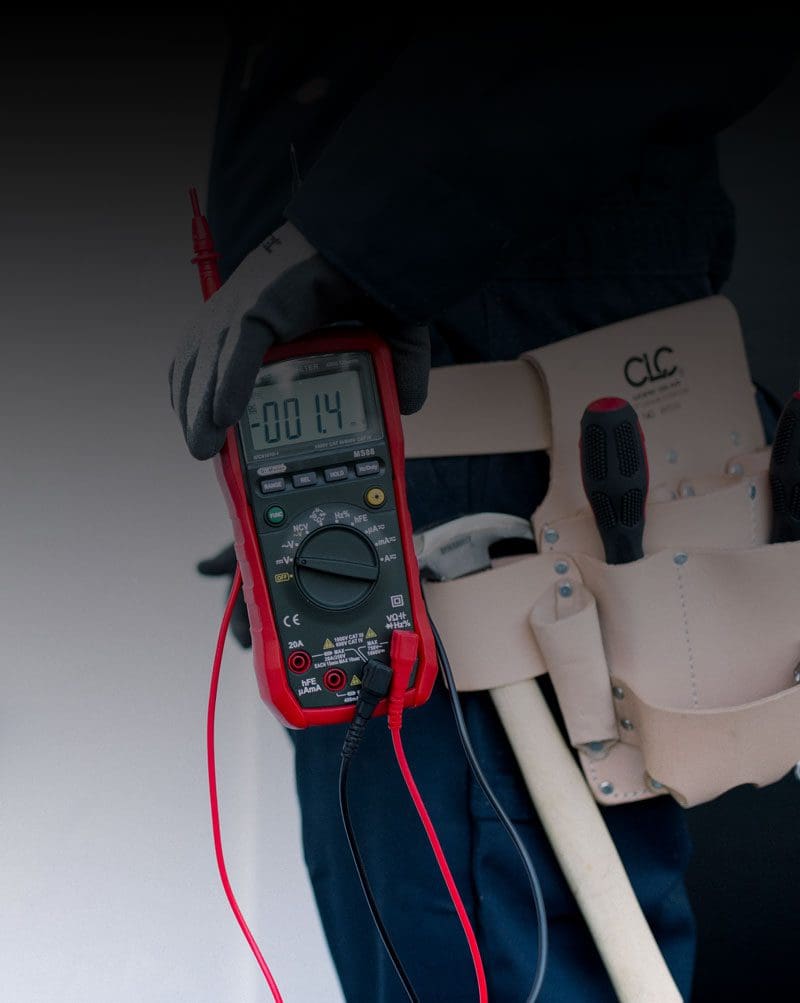Powering Up Britain:
The Efficiency of Solar Panel Systems in the UK.
The UK’s commitment to renewable energy has spurred a significant interest in solar panel systems for both homes and businesses. But how effective are they in a country often associated with grey skies? And what’s the financial outlook for those considering the switch? This article delves into the efficacy, costs, and returns of solar panels in the UK, alongside available government support.
Are Solar Panels Effective in the UK? Absolutely.
Despite its reputation, the UK receives ample sunlight throughout the year to make solar panels a highly effective energy solution. While efficiency naturally dips on cloudy days, modern photovoltaic (PV) panels are designed to capture diffuse light, meaning they still generate electricity.
- Efficiency: Most domestic solar panels in the UK boast efficiency ratings of 15-20%, with some advanced monocrystalline panels reaching up to 25% or more. Factors like panel type, shading, roof pitch (ideally 30-45 degrees south-facing), and maintenance can all influence actual output.
- Performance Guarantees: Reputable manufacturers typically offer performance guarantees of 20-25 years, ensuring panels maintain approximately 85% of their original capacity over this period. This demonstrates the long-term reliability and efficacy of solar technology.
Return on Investment (ROI) and Payback Periods
Investing in solar panels in the UK offers compelling financial returns, primarily through reduced electricity bills and income from the Smart Export Guarantee (SEG).
- Annual Savings: Homeowners can expect to save hundreds of pounds annually on their electricity bills by generating their own power. A typical 4kW solar panel system, for example, can lead to annual savings of £440-£1,005.
- Smart Export Guarantee (SEG): This government-backed initiative ensures that energy suppliers pay homeowners for any surplus electricity generated by their solar panels and exported back to the national grid. While export rates vary (typically around 3-5p per kWh), they provide an additional income stream.
- Payback Period: The average payback period for a combined solar and battery installation in the UK is around 7 years. This can range from 5-12 years depending on factors like energy usage, electricity rates, battery size, and the chosen tariff. Prioritising self-consumption (using the solar energy directly in your home) is key to maximising savings, as exported energy is generally valued less than the cost of importing from the grid.
- Overall ROI: Estimated average ROI for residential solar power systems in the UK can range from 10% to 25% over the lifetime of the PV modules. This makes solar a strong financial investment, especially with rising energy prices.
Average Installation Costs by Number of Panels
The cost of a solar panel system in the UK varies depending on the system size, type of panels, and installation complexity. Here’s a general guide to average costs:
| System Size (kWp) | Number of Panels (approx.) | Average Cost (ex. VAT) |
| 1kWp | 3 | £3,900 |
| 2kWp | 7 | £6,200 |
| 3kWp | 10 | £7,800 |
| 4kWp | 13 | £8,900 |
| 5kWp | 16 | £10,000 |
| 6kWp | 20 | £11,500 |
| 7kWp | 23 | £13,000 |
Prices are indicative and can vary based on installer, specific equipment, and regional factors.
For commercial installations, costs are significantly higher due to the larger scale:
| System Size (kWp) | Number of Panels (approx.) | Average Cost |
| 10 kWp | 30 | £12,780 |
| 25 kWp | 75 | £31,950 |
| 50 kWp | 150 | £63,900 |
| 100 kWp | 300 | £127,800 |
These costs typically include the panels, inverter, mounting system, electrical equipment, scaffolding, design, installation, testing, and MCS registration.
Economic Differences: Roof Mounted vs. Ground Mounted Solar Panels
The choice between roof-mounted and ground-mounted solar panels has distinct economic implications:
Roof-Mounted Solar Panels:
- Pros:
- Lower Cost: Generally 10-20% cheaper to install than ground-mounted systems, as they leverage existing structures.
- Space-Saving: Utilise otherwise unused roof space, ideal for urban and suburban properties with limited land.
- Often Permitted Development: Many residential roof installations don’t require specific planning permission, simplifying the process.
- Cons:
- Fixed Orientation: Limited by the roof’s direction and pitch, which may not always be optimal for maximum sun exposure.
- Shading Issues: More susceptible to shading from nearby trees or buildings.
- Accessibility for Maintenance: Can be harder and more expensive to clean or repair.
Ground-Mounted Solar Panels:
- Pros:
- Optimal Placement and Orientation: Panels can be positioned for maximum sun exposure and tilted to capture more light throughout the year, potentially increasing efficiency by 20-25% compared to sub-optimally placed roof panels.
- Ease of Maintenance: Easier to access for cleaning and repairs, potentially reducing long-term upkeep costs.
- Scalability: Not limited by roof size or condition, making them suitable for larger installations.
- Cons:
- Higher Initial Costs: Typically 10-20% more expensive than roof-mounted systems due to the need for additional mounting structures, groundwork (levelling, soil issues), and trenching for cables. This can add up to £5,000 in extra costs.
- Land Area Requirement: Require significant land, making them less suitable for properties with small gardens or in densely populated areas.
- Planning Permission: Most ground-mounted systems will require planning permission, especially if they exceed certain size or height limits.
- Shading Vulnerability: Can be more susceptible to shading from ground-level obstacles.
For most UK homeowners, rooftop solar panels are generally more practical and cost-effective due to lower installation costs and reduced land requirements. Ground-mounted systems typically only make financial sense for residential properties with very high electricity usage and ample land, or for commercial applications like solar farms.
Government Grants and Incentives
The UK government offers various incentives to encourage solar panel adoption for both residential and commercial clients:
Residential Clients:
- 0% VAT on Energy-Saving Materials: From April 2022 until March 2027, the VAT rate on solar panel installations for residential properties is 0%, significantly reducing the upfront cost.
- Smart Export Guarantee (SEG): As mentioned, this scheme pays homeowners for surplus electricity exported to the grid. All energy suppliers with over 50,000 domestic customers are required to offer an SEG tariff.
- Energy Company Obligation (ECO4 Scheme): This scheme targets low-income and vulnerable households, requiring energy suppliers to fund energy efficiency improvements, including solar panels. Eligibility often depends on receiving certain benefits or having a low EPC rating. Some households may even qualify for free solar panel installations.
- Warm Homes: Local Grant: Expected to be delivered from Spring 2025, this scheme funds eligible local authorities to provide energy performance upgrades, including solar panels, for low-income households in privately owned homes in England.
- Home Energy Scotland (for Scotland): Offers grants and interest-free loans of up to £7,500 for solar panel installations in Scotland.
- Nest Scheme (for Wales): Supports households on means-tested benefits in Wales with energy efficiency improvements, including solar panels.
Commercial Clients:
- Annual Investment Allowance (AIA): Businesses can claim 100% tax relief on qualifying capital investments, such as solar panels, up to £1 million each year. This effectively reduces the cost of solar installation by a quarter (based on a 25% Corporation Tax rate).
- First Year Allowances (FYA): Businesses can claim 50% tax relief on special-rate assets, including long-life assets like solar panels.
- Smart Export Guarantee (SEG): Commercial properties with solar PV systems up to 5MW capacity can also benefit from SEG payments for exported electricity.
- Local Growth Hub Solar Grants: Many Combined Authorities and Local Enterprise Partnerships offer regional grants. Some schemes have provided up to 30% capital grants towards the purchase and installation of rooftop solar PV for local businesses (e.g., West of England Growth Hub’s Rooftop Solar Grants).
- Improving Farm Productivity (IFP) Grant (DEFRA): This grant offers 25% capital support specifically for solar PV equipment on farm rooftops or reservoirs, with a minimum grant of £15,000 and a maximum of £100,000 per applicant.
- Farming Equipment & Technology Fund (FETF): Smaller grants (between £1,000-£25,000) are available to support technology that boosts productivity and environmental performance on farms, which can include solar PV.
- Public Sector Decarbonisation Scheme (PSDS): Provides grant funding for renewable energy installations, including solar panels, for public buildings, aiming to reduce energy costs and carbon emissions.
- UK Shared Prosperity Fund (UKSPF) Low Carbon Project: Extended until March 2026, this scheme helps small and medium-sized enterprises (SMEs) with financial contributions towards energy-saving interventions, including commercial solar panels, potentially covering up to 75% of eligible costs.
- Power Purchase Agreements (PPAs): While not a grant, PPAs allow businesses to install solar panels with zero upfront cost, as a third-party financier covers the installation and then sells the generated electricity to the business at a discounted rate.
Conclusion
Solar panel systems in the UK are demonstrably effective, offering significant long-term savings on energy bills and a healthy return on investment. While initial costs can be substantial, the various government grants and incentives available for both residential and commercial clients make solar power an increasingly attractive and accessible option. As the UK continues its transition to a greener future, embracing solar energy is not just an environmentally conscious decision but a financially savvy one too.
Our Services
Commercial Solar Panels
We have designed and installed high yield commercial solar panel systems for many clients. We can provide all design and payback calculations and ongoing maintenance.
Agricultural Solar Panels
We have many years experience designing and installing agricultural solar panel systems for farm businesses and saving them huge costs on electrical energy.
Residential Solar Panels
Our design and solar panel installation engineers have over a decade of experience installing and maintaining solar PV systems for residential customers across the UK
Electrical Contractors
We are NICEIC registered electrical contractors and members of the Electrical Contractors Association for all industrial, commercial and residential electrical services including testing, inspection and compliance services.
Mechanical Services
We offer M&E design, calculation, estimation and full fit-out, installation and maintenance services to commercial clients. We also provide contract maintenance and building compliance and testing services
Solar Renewables
We are MCS and RECC registered solar panel installers for all commercial and residential solar panel installations including ground arrays and roof mounted PV systems and battery storage configurations.
EV Home Chargers
We fit all makes, models and types of EV Chargers for residential customers. We are Office for Zero Emission Vehicles (OZEV) authorised installers.
EV Workplace Chargers
We can undertake all required aspects of commercial EV charging point installation, from initial design and consultation to servicing and on-going maintenance.
Gas Boiler Engineers
We are Gas Safe Registered and undertake boiler installation, servicing and all gas safety checks for landlords and residential customers.
Solar Panel Installer
Photovoltaic Systems generate no greenhouse gases, a typical domestic system can save approximately 1.2 tonnes of carbon dioxide emissions per year – adding up to almost 30 tonnes over a system’s lifetime.
Our design and solar panel installation engineers have many years experience installing solar PV systems for industrial and commercial clients.
Contact Us
Solar Panel Enquiry
Address
Keighley, West Yorkshire
BD21 4PF
UK
What3Words
What3Words:///clocks.decide.pokers
Phone
Keighley: 01535 687010 Skipton: 01756 793039




